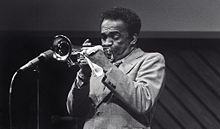Howard McGhee

Photograph by William P. Gottlieb .
Howard McGhee (born March 6, 1918 in Tulsa , Oklahoma , † July 17, 1987 New York City , New York ) was an American jazz trumpeter .
life and work
His family moved to Detroit when he was six months old. His first music lesson was playing the clarinet in high school. After leaving school, he switched to the tenor saxophone and went to California , where he played in Gene Coy's band. In 1935 McGhee switched to playing the trumpet , which he brought to mastery in the Art Bronson Band. Louis Armstrong was his great role model at the time. From 1936 to 1940 he played with local bands until Lionel Hampton discovered him: This brought him up in Andy Kirk's band. During this time he met Dizzy Gillespie , who influenced him musically. Short guest appearances with Charlie Barnet and Coleman Hawkins followed .
Dizzy Gillespie's pupil soon turned to bebop and was influenced by Roy Eldridge , the master of swing . In the mid-1940s he played in Charlie Parker's band as the successor to Miles Davis , recorded a number of records - u. a. for Black & White (“Ooda Coo Bop”) - and played with Lester Young , Sonny Criss , Dodo Marmarosa and Hampton Hawes . He became known through his sextet and the cooperation with Coleman Hawkins, as his successor on tenor saxophone he later recorded Teddy Edwards . McGhee toured with Norman Granz ' Jazz at the Philharmonic in 1947.

Photo: William P. Gottlieb
For his part, McGhee shaped the trumpet player Fats Navarro and the brothers Percy and Jimmy Heath , whom he accepted into his band in 1947/48. Joint recordings were made in 1948 with the singer Mary Ann McCall , the saxophonist Dexter Gordon and, for Savoy, with the sextet, which he led with Milt Jackson .
With Charlie Parker, Bud Powell and Bessie Smith, McGhee is one of the “great tragics” of jazz. The fact that he died in July 1987 exactly 20 years after John Coltrane and at the same time on the 28th anniversary of "Lady Day" Billie Holiday's death (1959) also contributed to the myth . Brian Priestley sees McGhee as an important link between swing and bebop.
Discographic notes
- 1945 Howard Mc Ghee On Dial - The Complete Sessions (Spotlite SPJ 131) with James Moody , Dodo Marmarosa, Hank Jones , Milt Jackson , Ray Brown , JC Heard
- Bird and Pres - The '46 Concerts Jazz at the Philharmonic
- 1948 Howard McGhee 1948 (Classics 1058) with Fats Navarro, Billy Eckstine , Jimmy Heath, Hank Jones, Ray Brown
- 1948 Howard McGhee & Milt Jackson (Savoy SV 1067)
- 1955 The Bop Master (Affinity AFF 765) with Pepper Adams , Duke Jordan , Tommy Flanagan , Sahib Shihab , Ron Carter , Percy Heath (two sessions from 1955 & 1960)
- 1961 Maggie's Back In Town (OJC 693) with Phineas Newborn , Leroy Vinnegar , Shelly Manne
- 1961 Sharp Edge (Black Lion) with George Coleman , Junior Mance , Jimmy Cobb
- 1976 Just Be There (Steeplechase SC 31204) with Horace Parlan , Kenny Clarke
- 1978 Home Run (Storyville STCD 8273)
- 1979 Wise In Time (Storyville STCD 8272)
literature
- Ian Carr , Digby Fairweather , Brian Priestley : Rough Guide Jazz. The ultimate guide to jazz. 1800 bands and artists from the beginning until today. 2nd, expanded and updated edition. Metzler, Stuttgart / Weimar 2004, ISBN 3-476-01892-X .
- Richard Cook , Brian Morton : The Penguin Guide of Jazz on CD . 6th edition. Penguin, London 2002, ISBN 0-14-051521-6 .
- Martin Kunzler : Jazz-Lexikon , Reinbek, Rowohlt 1988.
- Robert Reisner (Ed.): Bird - The Legend of Charlie Parker , New York, Da capo, 1993 ISBN 0-306-80069-1 .
Remarks
- ^ Another important influence was Roy Eldridge ; see. Priestley, p. 424.
| personal data | |
|---|---|
| SURNAME | McGhee, Howard |
| BRIEF DESCRIPTION | American jazz trumpeter |
| DATE OF BIRTH | March 6, 1918 |
| PLACE OF BIRTH | Tulsa , Oklahoma |
| DATE OF DEATH | 17th July 1987 |
| Place of death | New York City , New York |
